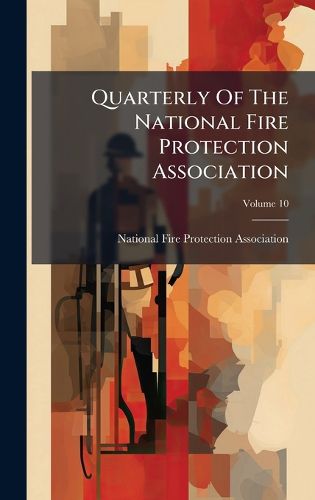Readings Newsletter
Become a Readings Member to make your shopping experience even easier.
Sign in or sign up for free!
You’re not far away from qualifying for FREE standard shipping within Australia
You’ve qualified for FREE standard shipping within Australia
The cart is loading…






This volume of the "Quarterly Of The National Fire Protection Association" presents a compilation of articles and reports related to fire prevention, fire safety, and fire protection engineering. Published by the National Fire Protection Association (NFPA), the journal provides insights into best practices, technological advancements, and case studies in fire management. Covering a range of topics from structural fire resistance to hazardous materials handling, this volume serves as a valuable resource for professionals in fire safety, building design, and regulatory compliance. The content reflects the NFPA's mission to reduce the worldwide burden of fire and other hazards, offering practical knowledge and guidance for mitigating fire risks in various environments.
This work has been selected by scholars as being culturally important, and is part of the knowledge base of civilization as we know it. This work was reproduced from the original artifact, and remains as true to the original work as possible. Therefore, you will see the original copyright references, library stamps (as most of these works have been housed in our most important libraries around the world), and other notations in the work.
This work is in the public domain in the United States of America, and possibly other nations. Within the United States, you may freely copy and distribute this work, as no entity (individual or corporate) has a copyright on the body of the work.
As a reproduction of a historical artifact, this work may contain missing or blurred pages, poor pictures, errant marks, etc. Scholars believe, and we concur, that this work is important enough to be preserved, reproduced, and made generally available to the public. We appreciate your support of the preservation process, and thank you for being an important part of keeping this knowledge alive and relevant.
$9.00 standard shipping within Australia
FREE standard shipping within Australia for orders over $100.00
Express & International shipping calculated at checkout
This volume of the "Quarterly Of The National Fire Protection Association" presents a compilation of articles and reports related to fire prevention, fire safety, and fire protection engineering. Published by the National Fire Protection Association (NFPA), the journal provides insights into best practices, technological advancements, and case studies in fire management. Covering a range of topics from structural fire resistance to hazardous materials handling, this volume serves as a valuable resource for professionals in fire safety, building design, and regulatory compliance. The content reflects the NFPA's mission to reduce the worldwide burden of fire and other hazards, offering practical knowledge and guidance for mitigating fire risks in various environments.
This work has been selected by scholars as being culturally important, and is part of the knowledge base of civilization as we know it. This work was reproduced from the original artifact, and remains as true to the original work as possible. Therefore, you will see the original copyright references, library stamps (as most of these works have been housed in our most important libraries around the world), and other notations in the work.
This work is in the public domain in the United States of America, and possibly other nations. Within the United States, you may freely copy and distribute this work, as no entity (individual or corporate) has a copyright on the body of the work.
As a reproduction of a historical artifact, this work may contain missing or blurred pages, poor pictures, errant marks, etc. Scholars believe, and we concur, that this work is important enough to be preserved, reproduced, and made generally available to the public. We appreciate your support of the preservation process, and thank you for being an important part of keeping this knowledge alive and relevant.